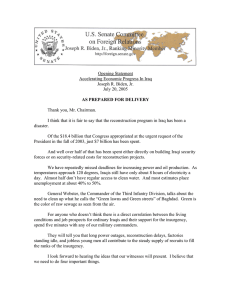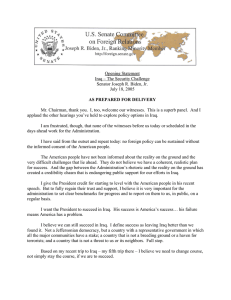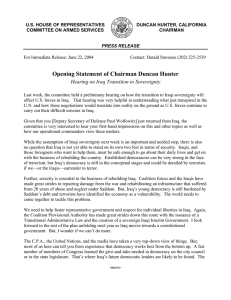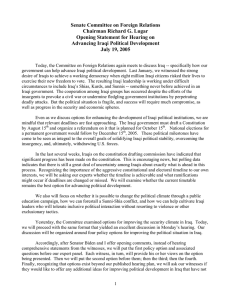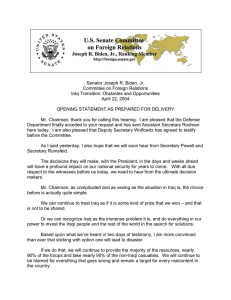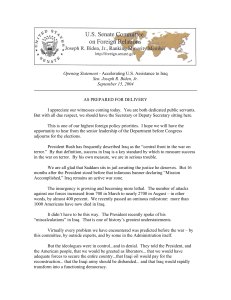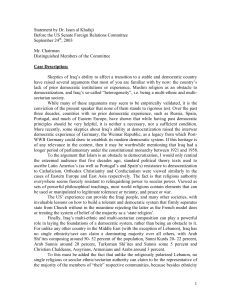Senate Foreign Relations Committee Chairman Richard Lugar Opening Statement for Hearing on
advertisement
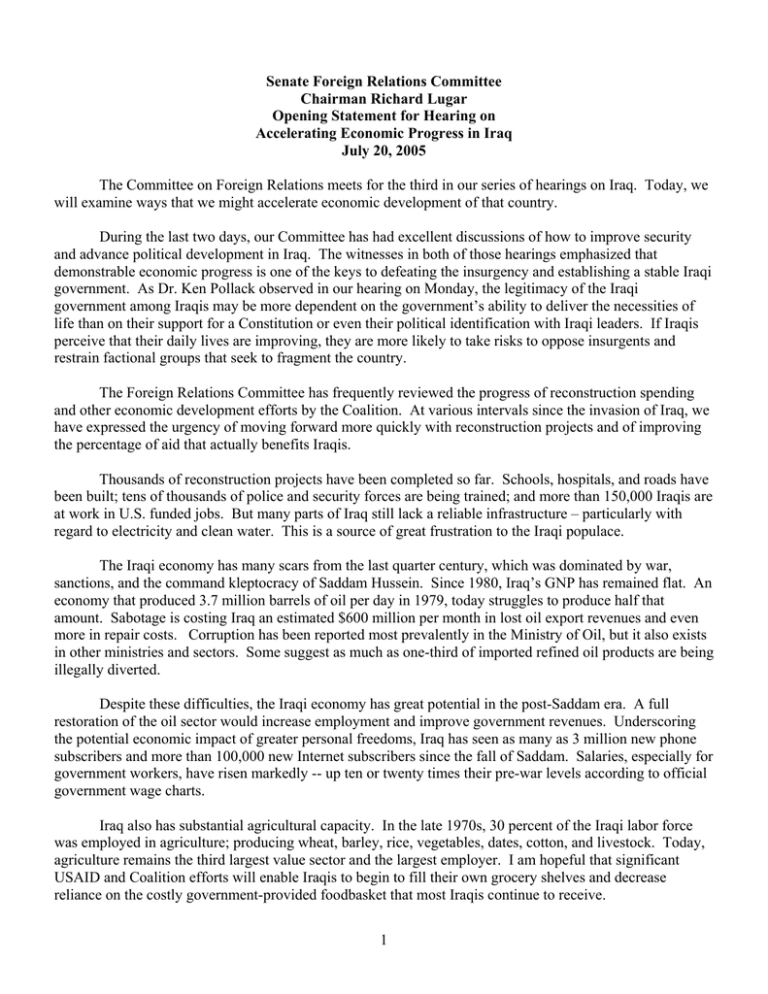
Senate Foreign Relations Committee Chairman Richard Lugar Opening Statement for Hearing on Accelerating Economic Progress in Iraq July 20, 2005 The Committee on Foreign Relations meets for the third in our series of hearings on Iraq. Today, we will examine ways that we might accelerate economic development of that country. During the last two days, our Committee has had excellent discussions of how to improve security and advance political development in Iraq. The witnesses in both of those hearings emphasized that demonstrable economic progress is one of the keys to defeating the insurgency and establishing a stable Iraqi government. As Dr. Ken Pollack observed in our hearing on Monday, the legitimacy of the Iraqi government among Iraqis may be more dependent on the government’s ability to deliver the necessities of life than on their support for a Constitution or even their political identification with Iraqi leaders. If Iraqis perceive that their daily lives are improving, they are more likely to take risks to oppose insurgents and restrain factional groups that seek to fragment the country. The Foreign Relations Committee has frequently reviewed the progress of reconstruction spending and other economic development efforts by the Coalition. At various intervals since the invasion of Iraq, we have expressed the urgency of moving forward more quickly with reconstruction projects and of improving the percentage of aid that actually benefits Iraqis. Thousands of reconstruction projects have been completed so far. Schools, hospitals, and roads have been built; tens of thousands of police and security forces are being trained; and more than 150,000 Iraqis are at work in U.S. funded jobs. But many parts of Iraq still lack a reliable infrastructure – particularly with regard to electricity and clean water. This is a source of great frustration to the Iraqi populace. The Iraqi economy has many scars from the last quarter century, which was dominated by war, sanctions, and the command kleptocracy of Saddam Hussein. Since 1980, Iraq’s GNP has remained flat. An economy that produced 3.7 million barrels of oil per day in 1979, today struggles to produce half that amount. Sabotage is costing Iraq an estimated $600 million per month in lost oil export revenues and even more in repair costs. Corruption has been reported most prevalently in the Ministry of Oil, but it also exists in other ministries and sectors. Some suggest as much as one-third of imported refined oil products are being illegally diverted. Despite these difficulties, the Iraqi economy has great potential in the post-Saddam era. A full restoration of the oil sector would increase employment and improve government revenues. Underscoring the potential economic impact of greater personal freedoms, Iraq has seen as many as 3 million new phone subscribers and more than 100,000 new Internet subscribers since the fall of Saddam. Salaries, especially for government workers, have risen markedly -- up ten or twenty times their pre-war levels according to official government wage charts. Iraq also has substantial agricultural capacity. In the late 1970s, 30 percent of the Iraqi labor force was employed in agriculture; producing wheat, barley, rice, vegetables, dates, cotton, and livestock. Today, agriculture remains the third largest value sector and the largest employer. I am hopeful that significant USAID and Coalition efforts will enable Iraqis to begin to fill their own grocery shelves and decrease reliance on the costly government-provided foodbasket that most Iraqis continue to receive. 1 Today, we will ask our witnesses to comment on a number of subjects. We are particularly interested in how the oil sector can be revived and protected from corruption and sabotage. We also will discuss whether our economic development strategy should be more decentralized and whether it should emphasize creating jobs and demonstrating tangible improvements in the everyday lives of Iraqis. In addition, we will explore what type of statistical indicators could be produced to provide a clear and credible picture of economic progress in Iraq. Such indicators would be designed both to inform policy decisions and to give the Iraqi people a better notion of what is happening in their country. We will proceed with the same format that yielded excellent discussions in our hearings on Monday and Tuesday. Our hearing will be organized around four policy options for accelerating economic progress in Iraq. Accordingly, after Senator Biden and I offer opening comments, we will put the first policy option and associated questions before our expert panel. Each witness, in turn, will provide his or her views on the questions being presented. Then we will put the second option before them; then the third; then the fourth. Finally, recognizing that ideas exist beyond our published hearing plan, we will ask our witnesses if they would like to offer any additional thoughts on improving the Iraqi economy that have not been discussed. After this sequence, Committee members will be recognized in turn to address questions to any member of the panel. My hope is that through the expertise of the witnesses and the questions of the members, we can achieve a systematic evaluation of the options presented for accelerating economic progress in Iraq. We are pleased to welcome a distinguished panel of experts to help us with our inquiry. Dr. Keith Crane is a Senior Economist at the RAND Corporation. He served on the Coalition Provisional Authority staff during 2003. I also would like to observe that Dr. Crane did his doctoral work at Indiana University. Mr. Frederick Barton is Senior Adviser in the International Security Program at the Center for Strategic and International Studies and has taken several research trips to Iraq since the end of the war. Mr. Fareed Mohamedi is Senior Director of the Country Strategies Group at PFC Energy and has been studying the economies of oil-producing nations in the Middle East for many years. These experts have spent a great deal of time analyzing the Iraqi economic situation, and we are grateful that we can draw on their experience and insights. ### 2

